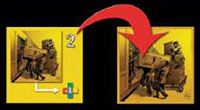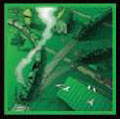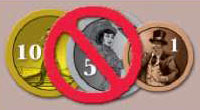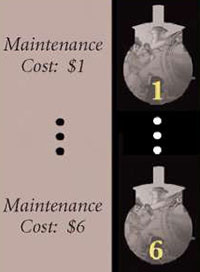
Once you have mastered the Base Game, you can move to the Standard Game for a much higher level of complexity. There are three key differences between the Base Game and the Standard Game.
Each player must decide how much money to raise at the start of each turn and cannot raise more money during the turn. The players bid for their positions in the turn order every turn (but do not make any other payment for the Action tile that they select). Finally, each player has to pay for the upkeep of his locomotive every turn.
These changes mean that there is less money avail- able and the players have to plan ahead very carefully, or risk going bankrupt.
The game ends after the same number of turns specified in the Base Game rules, and the winner is determined in the same way as well. Unless specified here, all other Base Game rules stay in effect.
The phases of the turn are slightly different.
Initial Setup
Determine the initial player order randomly by distributing Action tiles and placing player tokens in order from lowest value to highest value. The player with the lowest value action will bid first.
Flip the Action tiles to their non-numbered side. The Action values and costs print- ed on one side of the tiles are not used in this version.

Standard Game Phases
- Buy Capital
- Determine Order of Play
- Select Action Tiles
- Build Track
- Move Goods
- Collect Income & Pay Expenses
- Set Up New Turn
Phase 1 - Buy Capital
In the Standard Game, you "buy capital" once per turn instead of raising money from the bank as need- ed. Buying capital uses the Base Game rules (see page 4) regarding raising money-$5 for each space you move back on the Income Track.
However, in the Standard game, you may only buy capital during phase 1. Players buy capital in turn order. You cannot buy capital to raise money during any other phase of the game. All payments made during phases 2 to 6 must be made from your cash on hand.
It is very easy to leave yourself with insufficient cash to make it through a turn. In particular, it is very easy to make such a mistake on the first turn, leaving yourself with insufficient money to survive the first turn or two. So, we recommend that you buy capital equal to $10 or more at the start of the game.
Experienced players who want to use the Standard Game rules may wish to relax this restriction for less experienced players. For example, allow newer players to raise money for track costs and/or maintenance costs as needed.
Phase 2 - Determine Order Of Play
Players bid for turn order every turn. Note that this auction differs from the one used in the Base Game!
Bidding begins with the current first player (who may bid $0) and it continues in player order. On your turn to bid, you must either outbid the current highest bidder or pass. You may not bid more than you have available in cash. Once you have passed, you are out of the bidding, and you may not re-enter the auction.
If you pass during the auction, you place a token on the last free space on the Turn Order Display. The first player to pass will go last in the turn; the next player to pass will go before the last player but after everyone else; and so on.
When each of the players- except one-have passed during the auction, the remaining player (the highest bidder) places a token on the first position on the Turn Order Display.
Turn Order Action Tile

The Turn Order Action tile has a new effect in the Standard Game. If you chose the Turn Order Action tile on the preceding turn, you may pass once during the auction without dropping out and placing your token on the Turn Order Display.
You can either re-enter the bidding the next time that it is your turn to do so, or pass at that stage. If you pass a second time, your token is placed on the Turn Order Display in the last position that is unoccupied when you pass for the second time.
Paying For Your Bid
Players must make a payment to the bank for their bid. Each of the players in first and second place on the turn order display must pay the full amount of his bid. The player in last place on the Turn Order Display pays nothing. Each other player pays one half of the amount that he bid (rounding up as necessary).

Phase 3 - Select Action Tiles
As with the Base Game, Action tiles are selected in player order. However, you do not make any payment for the selected Action tile, either when it is chosen or when it is played. If you select Urbanization or City Growth you may choose not to use the Action when it is your turn to build track (i.e., you can pass).

Phases 4 and 5
Phases 4 and 5 are played in accordance with the Base Game rules in this booklet, with one key differ- ence. Remember, players cannot raise money to meet expenses by moving back on the Victory Point Track. The only income that you receive is in phase 1 for buying capital, and in phase 6 if your income exceeds your expenses.
You must pay for any track building with cash- you cannot choose to spend more money on track building than you have available on hand. If you have the City Growth or Urbanization Action tiles, you may use the Pass Option in lieu of placing a New City tile or cubes.
Phase 6 - Collect Income & Pay Expenses
During the Income & Expenses phase, you must now pay maintenance costs based on your Locomotive Level. For each Locomotive Level you have, you pay a maintenance cost of $1.
If you have a level 3 locomotive, you will pay $3 in addition to any income (or expenses) you may have; the owner of a level 6 locomotive must pay $6 each turn.

If at any time you are unable to make a required payment, you must pay as much as you can with the cash that you have on hand. Then you must move back one space on the Victory Point Track for every $2 you are still short.
If this pushes you to 0 on the Victory Point Track, begin dropping on the Income Track using the same 1 point = $2 rate. If your expenses paid in this fashion are an odd value, you receive the $1 in change.
If you have no cash, no VPs, and your income is -$ 10-and you still owe money-your railroad has gone bankrupt! As in the Base Game, your tokens are removed from the board and you are out of the game.
Any completed links that you owned will remain unowned for the duration of the game. Other players can claim any incomplete links that you owned in the usual manner. If a Goods cube is moved along an unowned link, no victory point is scored for that link.
Continue Reading
